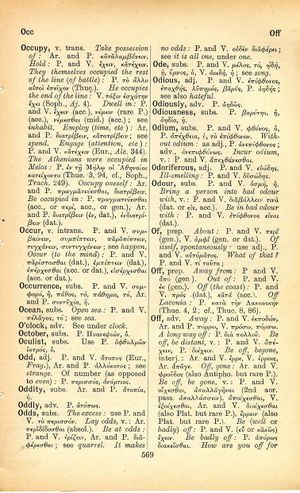occupy
Θνητὸς πεφυκὼς τοὐπίσω πειρῶ βλέπειν → Homo natus id, quod instat, ut videas, age → Als sterblich Wesen mühe dich zu seh'n, was folgt
English > Greek (Woodhouse)
v. trans.
Take possession of: Ar. and P. καταλαμβάνειν. Hold: P. and V. ἔχειν, κατέχειν. They themselves occupied the rest of the line (of battle): P. τὸ ἄλλο αὐτοὶ ἐπεῖχον (Thuc.). He occupies the end of the line: V. τάξιν ἐσχάτην ἔχει (Soph., Aj. 4). Dwell in: P. and V. ἔχειν (acc.), νέμειν (rare P.) (acc.), νέμεσθαι (mid.) (acc.); see inhabit. Employ (time, etc): Ar. and P. διατρίβειν, κατατρίβειν; see spend. Engage (attention, etc.): P. and V. κατέχειν (Eur., Alc. 344). The Athenians were occupied in Melos: P. ἐν τῇ Μήλῳ οἱ Ἀθηναῖοι κατείχοντο (Thuc. 3, 94, cf., Soph., Trach. 249). Occupy oneself: Ar. and P. πραγματεύεσθαι, διατρίβειν. Be occupied in: P. πραγματεύεσθαι (acc., or περί, acc., or gen.), Ar. and P. διατρίβειν (ἐν, dat.), ἐνδιατρίβειν (dat.).

